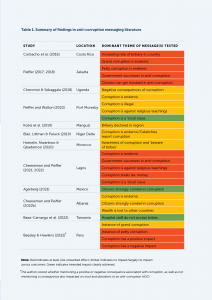Anti-Corruption Messaging Campaigns Can Backfire: CIPE’s New Guide Can Help

CIPE’s new How-to Guide to Anti-Corruption Messaging offers actionable guidance to anti-corruption practitioners interested in developing effective messaging campaigns as part of their broader theory of change. This guide provides an accessible framework to “level up” anti-corruption work, providing practical advice such as avoiding negative messaging about the extent of the problem, avoiding “blaming and shaming” the audience, and articulating a clear call to action when appropriate.
Produced in partnership with Caryn Peiffer, Associate Professor in International Public Policy and Governance at the University of Bristol, and Nic Cheeseman, Professor of Democracy at the University of Birmingham, and the National Democratic Institute (NDI), the Guide helps campaigners avoid wasting precious resources or distributing messages around anti-corruption advocacy that have unwanted effects. The campaigners designing anti-corruption messaging campaigns — be they civil society groups, public officials, anti-corruption institutions, or donors — face a terrible risk when developing their campaigns, particularly if awareness-raising is a component of the messaging.
Understanding Risks When Creating Anti-Corruption Messages

One issue with awareness-raising is that it can implicitly communicate to the audience that corruption is widespread and that people just like them are complicit in it. Messaging about corruption in this case is then merely describing an undesirable norm — which risks suggesting to audiences the harmful idea that complacency is logical and thus undermines efforts to resist corruption or to call on public officials to do more to curb corruption.
In 14 major studies that have been conducted regarding the impacts and efficacy of anti-corruption messaging, nearly half of the messaging efforts backfired or produced some kind of unwanted effect (see Table 1). Each study has one or more dominant messaging themes. Of the 27 messaging themes reviewed in those studies, a mere 11% had the desired impact. If you are a campaigner or anti-corruption practitioner and you are considering whether and where to allocate scarce resources, those results are not encouraging — but the new guide offers a chance to reduce the risk of campaigns backfiring or being ineffective.
Tailored Messaging Promotes Effective Campaigns
An idea of central importance in the guide is the “three Ts”: tailoring, targeting, and testing messaging before deploying. It is crucial for campaigners to tailor the message to suit their audience — to consider their prior knowledge, beliefs, and dispositions. Moreover, to effectively target the audience, campaigners need to assess who in society, be it an individual or an institution, is best positioned to deliver a message about anti-corruption. Lastly, testing messages prior to deploying them is essential because it is the only way that campaigners can assess whether their designed messages will likely lead to the desired impacts. The guide breaks down how testing can be done through focus groups, surveys, and experimental approaches. Given the vast amount of time and resources put into anti-corruption awareness-raising each year, the resources required to tailor and target messages as well as test the likely efficacy of those messages is relatively small and represents an excellent value for money.
Beyond the three Ts, the guide offers some fundamental design principles:
- Make sure messaging is clear, concise, and consistent
- Avoid negative messaging about the extent of the problem
- Avoid blaming and shaming the audience
- Consider using credible positive messaging
- Choose the right messenger
- Articulate a clear call to action, if applicable
In addition to the guide itself, the authors have developed a workshop curriculum that can be offered in a half-day or full-day format to interested organizations. In these CIPE-supported workshops, Peiffer and Cheeseman will go through the curriculum with participants, helping them to plan out how best to design their respective anti-corruption messaging campaigns. These workshops are intended to be conducted in person, but the authors are open to arranging virtual workshops as well.
Those interested in arranging a workshop with the authors are encouraged to reach out to acgc@cipe.org.
